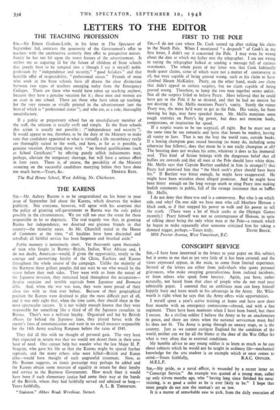THE K ARENS
SIR.—Mr. Aubrey Buxton is to be congratulated on his letter in your issue of September 3rd about the Karens, which deserves the widest publicity. Not everyone, however, will agree with his assertion that the policy of granting self-government to Burma was the only policy possible in the circumstances. We are still too near the event for those responsible to be so dogmatic. The real tragedy was that, in granting Burma her independence, we deserted our greatest friends in that country—the minority races. As Mr. Churchill stated in the House of Commons at the time, " all loyalties have been discarded and rebuffed; all faithful service has been forgotten and brushed aside."
Public memory is notoriously short. Yet thousands upon thousands of men who fought in Burma—British, Indian, West African and, I do not doubt, American—would, if given the opportunity, testify to the courage and unswerving loyalty of the Chins, Kachins and Karens throughout the whole course of the campaign. Unlike the majority of the Burmese these gallant peoples did not wait to see who would be the victor before they took sides. They were with us from the outsei of the Japanese invasion, they remained loyal throughout the occupation— despite coejcion and terrible reprisals from Japanese and Burmese alike. And, when the war was won, they were more proud of their close ties with us than ever before. Because of their geographical position the Karens were destined to play the most difficult part of all, and it was only right that, when the time came, they should share in the most spectacular success. It is not widely enough known that they were responsible for something like a third of all the Japanese casualties in Burma. Their's was a militant loyalty. Organised and led by British officers far behind the Japanese lines, they played havoc with the enemy's lines of communication and were in no small measure responsible for the 14th Army reaching Rangoon before the rains of 1945.
They did all this with no thought of personal gain. The very least they expected in return was that we would not desert them in their own hour of need. One cannot help but wonder what the late Major H. P. Seagrim, who gave his life so that the Karens might be spared further reprisals, and the many others who were killed—British and Karen alike—would have thought of such ungrateful treatment. Now, as Mr. Buxton suggests, an ironic postscript may perhaps be added and the Karens obtain some measure of equality in return for their loyalty and service to the Burmese Government. How much finer it would have been if such elementary justice had come their way at the hands of the British, whom they had faithfully served and admired so long.—
" Swinton." Abbev Road. Worthing. Sussex.


































 Previous page
Previous page